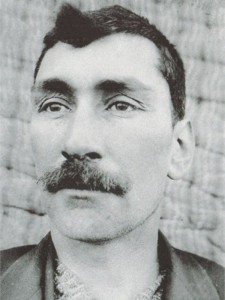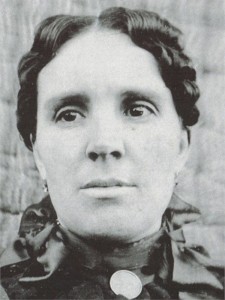gee
 Like many people, my great grand uncle, Cornealius Spencer and his wife Leola Stinson Spencer left Iowa and made their way to Oklahoma in the spring of 1893. With them were their children and Leola’s parents. They had heard that the government was giving away land and they had decided to make a new start. The homestead they received was 160 acres, but the land came with qualifications. The homestead owner was required to fence the land, build a building, and live on the land for a period of one year before it became theirs. When I think of those reasonable qualifications, in light of today and all we have now, I think that the land they received was really cheap…and maybe it was, but times were different then, and living on a piece of land that had no improvements, and the soil was hard and rocky, might not have been so easy. They didn’t have the farming equipment we have now, so they had to till the ground with a team of horses or a yoke of oxen and a hand plow. They couldn’t just run down to the lumber store to buy building supplies. They had to cut down their own logs to build a home, or live in a sod hut…which many people then did for a time.
Like many people, my great grand uncle, Cornealius Spencer and his wife Leola Stinson Spencer left Iowa and made their way to Oklahoma in the spring of 1893. With them were their children and Leola’s parents. They had heard that the government was giving away land and they had decided to make a new start. The homestead they received was 160 acres, but the land came with qualifications. The homestead owner was required to fence the land, build a building, and live on the land for a period of one year before it became theirs. When I think of those reasonable qualifications, in light of today and all we have now, I think that the land they received was really cheap…and maybe it was, but times were different then, and living on a piece of land that had no improvements, and the soil was hard and rocky, might not have been so easy. They didn’t have the farming equipment we have now, so they had to till the ground with a team of horses or a yoke of oxen and a hand plow. They couldn’t just run down to the lumber store to buy building supplies. They had to cut down their own logs to build a home, or live in a sod hut…which many people then did for a time.
The families arrived with two covered wagons and Leola with two small children…four year old Oren and two year old Edith. The wagons were pulled by a pair of oxen. With no bits or lines to guide the oxen. They pulled the wagon by a yoke and Leola had to guide them by the voice commands or “gee” and “haw” for left and right and “whoa” for stop. The milk cow was tied to the wagon and the family brought along a coop of chickens. They camped out at night, and let the chickens eat the bugs in the area. There were no roads to get to Oklahoma, so they had to simply go across the prairie.
Once they arrived in Blaine county, the men filed on two places that were next to each other. Each place had a spring for water, until a well could be dug. They dug a dugout near the spring, and were settled by June 12,  1893, when their new daughter Elsie Jane was born. They lived in the dugout until a home could be built. There were no towns close, so they had to rely on what they could hunt. Thankfully there was an abundance of deer, rabbits, turkeys, and even squirrels, so they never went hungry. Both Cornealius and Leola were excellent shots, so it didn’t matter who was available to hunt, both were able to get food for the family.
1893, when their new daughter Elsie Jane was born. They lived in the dugout until a home could be built. There were no towns close, so they had to rely on what they could hunt. Thankfully there was an abundance of deer, rabbits, turkeys, and even squirrels, so they never went hungry. Both Cornealius and Leola were excellent shots, so it didn’t matter who was available to hunt, both were able to get food for the family.
I can fully understand why it was so hard to make a homestead work now, because the supplies the homesteaders needed were not readily available. Many people gave up and headed back east, but my great grand uncle and his family stuck it out, and spent their remaining years in Oklahoma. They would raise their ten children there and were very successful in their endeavors. Homesteading wasn’t designed to be easy. Getting 160 acres of land is a big deal, and while the land ended up being free in the monetary sense, it certainly did not in the blood, sweat, and tears sense. The homesteader earned every inch of that property.

